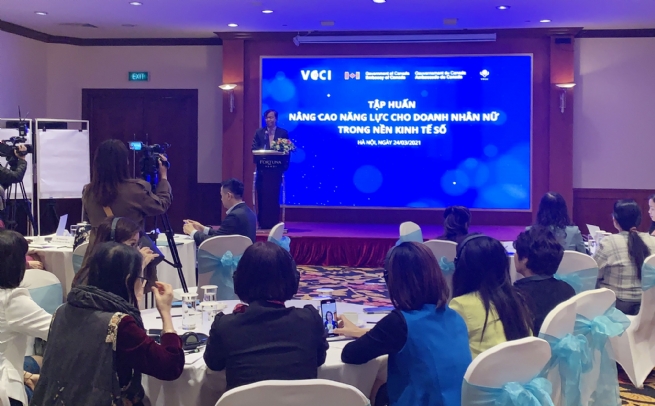9:40:19 AM | 3/29/2021
The current digital transformation is not only a trend but an inevitable development requirement of all economies in the world. Vietnamese businesses cannot stay out of this reality, especially for micro, small and medium-sized enterprises (MSMEs).
In order to help women-owned MSMEs update information, improve knowledge of digital transformation and quickly adapt to the digital economy, Vietnam Women Entrepreneurs Council (VWEC)- VCCI, with the support of the Embassy of Canada in Vietnam, recently organized a training program on "Capacity building for women entrepreneurs in the digital economy".

Boost to digital transformation
Ms. Nguyen Thi Tuyet Minh, Chair of VWEC - VCCI, said, the Covid-19 pandemic is a "big accelerator" that has hastened digital transformation, which has become stronger than ever. Digital transformation brings great benefits to the Vietnamese business community in general and women-owned businesses in particular, especially in commercial transactions and customer base development, fills the geographical gap, reduces time, slashes various costs while increasing profits for businesses. The national digital transformation program, devised to enable a digital government, digital economy and digital transformation, will help create a more favorable and transparent business environment and boost the capacity of enterprises, especially SMEs.
Ms. Deborah Paul, Canadian Ambassador to Vietnam, said, Covid 19 has shown up strong efforts of Vietnam to bolster the economy as well as digital transformation. Currently, many SMEs are still facing difficult access to e-commerce and digital transformation. Therefore, Canada will continue to partner with VWEC to support female entrepreneurs in approaching and changing business outlook and perception to be more competitive in the digital economy.
Innovations must be uninterrupted
Mr. Nguyen Hoa Cuong, Vice President of the Central Institute for Economic Management (CIEM), said that Vietnam has many digital transformation policies, including Resolution 52-NQ/TW of the Politburo dated September 27, 2019 on active participation in the Fourth Industrial Revolution; Decision 749/QD-TTg of the Prime Minister dated June 3, 2020 on approval of the “National Digital Transformation Program to 2025 and further to 2030” - Digital transformation at national and local levels: Digital government, digital economy and digital society; and Decision 2289/QD-TTg of the Prime Minister dated December 31, 2020 on promulgation of the National Strategy on the Fourth Industrial Revolution to 2030: Overall action plans at all levels and sectors.
In addition, the Ministry of Planning and Investment has cooperated with the United States Agency for International Development - USAID (SmeLink Project) from December 2020 to carry out the Digital Transformation Business Program for the 2021-2025 period (http://digital.business.gov.vn), which sets a target of having 100,000 businesses given technical support and making at least 100 model enterprises successful.
Together with other programs and plans at the central level, digital transformation plans launched by many ministries are taking place. Therefore, in 2021, this opportunity is in the hands of businesses themselves, he said.
However, in reality, the rate of companies interested in science and technology, digital transformation and innovations is not high. According to VCCI's data, only 21% of Vietnamese enterprises have joined in global value chains, compared with 30% in Thailand and 46% in Malaysia. Their revenue for science and technology is very low. Data released by the Ministry of Science and Technology showed that, among 7,641 surveyed companies, 4,709 (61%) had innovations, 2,841 (37%) had no innovations, and 91 (2%) had no idea about innovations. Meanwhile, according to data from the Academy of Military Technique, the cost for science, technology and R&D of Vietnamese enterprises only accounts for an average of 0.3% of revenue, too little compared to foreign countries (India, 5%; South Korea, 10%; and Japan, 50%). The average cost for this in developed ASEAN countries (Singapore, Thailand and Malaysia) is at least 9% of total revenue. According to the statistics of the Ministry of Industry and Trade, up to 98% of Vietnamese industrial enterprises have done either nothing or very little to prepare for Industry 4.0.
To enhance the capacity of women-owned MSMEs in the digital economy, Nguyen Nhat Quang, Vice President of Vietnam Software and Information Technology Services Association (VINASA) that, it is necessary to improve knowledge of digital transformation and quickly adapt to digital economy; review stages, restructure the market, restructure the business, choose business plans, opt for technology, and train employees; work out plans, prepare resources and define a roadmap for each step of transformation in accordance with their conditions.
To have smart products and services, it is necessary to position the business in the marketplace and innovate products and services, he said. To have smart business, it is necessary to integrate digital technology to automate and optimize the process, reduce costs, and improve competitiveness. In order to have an intelligent management system, they need to base on data to make decisions, make breakthroughs in business models, and promptly respond to changes in the business environment.
It is impossible to describe exactly what the digital future is like, adaptive innovations must be thus continuous. The culture of innovation must be incorporated into each member, starting from investment in adopting the new, the strange. On the other hand, companies must always keep an eye on new externalities and competitors; always listen to customers and partners and discuss internally what is heard. "Customer opinion is an important source of information for making products and services better," Quang affirmed.
Source: Vietnam Business Forum